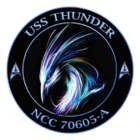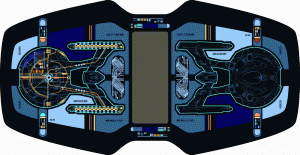Thunder-A Deck Layout/Main Engineering
|
Officially located on Deck 15 of the Thunder, Main Engineering is the thriving heart of any vessel in space. As almost every system of the vessel can be accessed from here, the main hub of the department also spans over decks 14 and 16. Here further system access or workspace in the form of engineering and manufacturing labs is provided for the vessels large technical crew complement. Those systems too small, complex and far from the Thunder’s engineering hub to justify a physical connection, are remotely monitored in real-time via an independent network of sensors. In general any system status, be it repair management, power flow or simply progress of general maintenance can be drawn on from here.
Due to the size of the Thunder-A’s engineering hub, it also has a decent compliment of secondary and special access routes in and out of Engineering to take into account. This is perhaps one of the reasons why Engineers never seem to leave the drive room, though also provides a tactical nightmare when defending this vital ship section from intruders. For this reason the Thunder-A’s entire engineering cavern, spanning three decks, can be completely locked down via a combination of conventional blast doors and high level security fields. Warp SystemThe Thunder-A’s main form of propulsion is provided by the same M/ARA system that is found on each of the Federation’s vessels. The original Akira design instrumentalized a standardized RamJet Mark 1 Standard M/AMRD, however, improvements in warp theory, geometry, materials design and construction processes have been combined with experiences gathered over the last quarter of a century since the Akira class has been in service. These insights have led to a hybrid of the class 7 and 8 M/ARA of the Defiant and Sovereign classes respectively. The class 7 beta of General Electric features the multi-lobed magnetic constriction segments, premiered in the class 7 and 8 designs. The Thunder utilizes a type 7a M/ARA, which is in effect a beefed up class 7, implementing four matter streams (one main stream with three secondary reactant columns.) The computer controlled dilithium articulation chamber used on the Sovereign class also finds application aboard the Thunder-A. The increase in reaction efficiency further complements the vessel’s power production.
Experimental TechnologyAlthough the section isn’t exactly what it says on the tin, some of the Engineers on the Thunder-A have at some point been involved in technology research at Utopia Planitia. Using the resources and multiple opinions available to them, the Engineers on board are able to carry on research into a wide variety of deep space systems, including advancements in the LCARS system and an experimental EEH (Emergency Engineering Hologram). Continued research into these systems has not had a direct benefit on the Thunder as of yet. No advancements have been made as much of the research hasn’t left the library. However, they’re forever hopeful. Typical crew compliment in Main Engineering consists of twenty engineers and forty technicians of various grades. During Red or Yellow Alert, that number is increased. Perhaps a single fact about the Thunder is the senior ‘team’ they have, unlike other departments. Due to Engineering being such a vast department, it seemed necessary to have subsection departmental heads, working effectively. It hasn’t failed yet.
Chief Engineer's OfficeThe Chief Engineer's Office comprises of several different displays around the room in accordance with different systems on board the Thunder. Here, the Chief Engineer can see what is going on in the maintenance and the basic running of the ship. It is a room where the CEO can work privately. It is decoratorable, as is all others, with whatever is personal to the occupier. |



